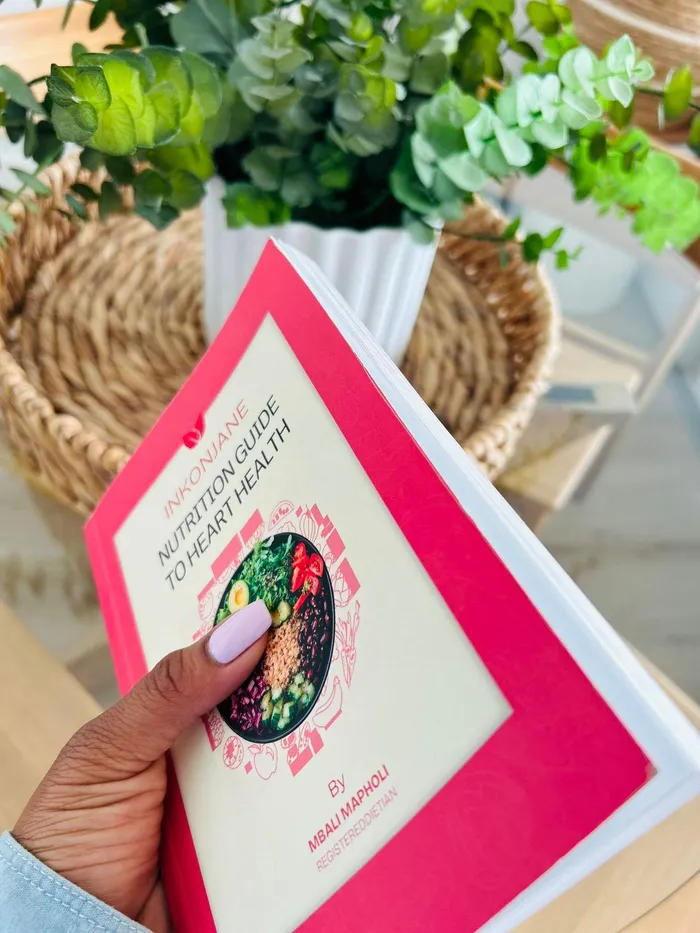
Dietitian and author Mbali Mapholi aims to bring the principles of “Inkonjane” to life through practical demonstrations.
Image: Supplied
A new book titled “Inkonjane” is entering South Africa’s literary and health landscape, offering a practical approach to nutrition and heart health.
The title, drawn from the isiZulu word for the swallow bird, carries symbolic meaning for its author.
“The inkonjane is my favourite bird. It is small but full of life. The name reflects something small yet powerful, just like the everyday choices we make that impact our heart health,” the author, Mbali Mapholi, explained.
“It embodies growth, resilience and nurturing. Small, intentional steps in our diet and lifestyle can have a profound effect on cardiovascular wellness.”
The book was motivated by personal experiences. Mapholi recalled how family struggles with high blood pressure and heart-related conditions revealed a lack of culturally relevant resources.
“I noticed a gap in resources that speak to our foods, our traditions and our realities. Many people feel overwhelmed by generic nutrition advice that fails to reflect their unique lives."
"I wanted to create a guide that makes heart health accessible and relatable. It is also something I wished my family had when my dad was struggling with heart health and my grandmother with high blood pressure.”
Unlike many health books available on the market, “Inkonjane” is neither a recipe book nor a clinical manual. It is presented as a practical guide, grounded in African heritage and culture.
“It focuses on everyday foods, real-life tips and emotional connections to food. It is about building heart-healthy habits without restriction or expensive ingredients.”
“The book blends science with relatable case studies and food rituals. It is the type of book that gives you a quick formula to create nourishing plates with what you already have,” she said.
The guide is intended for a wide audience. It is particularly beneficial for individuals managing high blood pressure, cholesterol or a family history of heart disease, while also serving those who wish to prevent heart problems.
It also extends to caregivers, health professionals and wellness brands.
“The book is for everyone. It is my personal ‘why,’ rooted in my family’s experience but designed to reach households, communities and professionals who need practical and culturally relevant guidance.”

New book "Inkonjane" brings a practical guide to nutrition and heart health in South Africa.
Image: Supplied
South African diets, Mapholi argued, contain habits that increase heart risk. “We are a salty nation. Our taste buds are drawn to salt. Limited vegetable consumption and portion sizes are big contributors, too.”
“People underestimate the impact of sugar and fried foods on blood pressure and cholesterol. The way we dish up also plays a role - we start with starch, add lots of meat and leave vegetables as an afterthought.”
Rather than rejecting traditional food culture, “Inkonjane” shows how to adapt it.
“Culture is at the heart of what we eat. You do not need to give up traditional foods to eat healthily. The book shows how to adjust beloved dishes to be lower in salt, sugar and unhealthy fats while keeping the flavours families love. It is about inclusion, not restriction.”
The guide also highlights the role of stress and mental health in heart wellness.
“Stress has a direct impact on blood pressure, lifestyle habits and emotional eating. The book provides tips on mindful eating, stress management and self-care routines.”
“Beyond the tips, I wanted the writing itself to reassure readers. Many people feel anxious about food. ‘Inkonjane’ encourages them to start small, make mistakes and still nourish their hearts.”

Dietitian and author Mbali Mapholi aims to bring the principles of “Inkonjane” to life through practical demonstrations.
Image: Supplied
Writing the book came with challenges. Mapholi admitted to wrestling with doubts.
“The hardest part was making complex nutrition science practical and relatable. I also struggled with imposter syndrome, asking myself, ‘Who am I to write this?’ I’m just a girl from KwaNongoma trying to do something that has not been done in the South African nutrition space.”
“I worried that simplifying the content might make it feel too basic.”
She overcame these fears by leaning on her clinical experience and real-life feedback. “Every tip in the book had to be actionable, authentic and resonate with readers.”
She also addressed common misconceptions about nutrition and heart health.
“Many people believe heart-healthy eating is bland, expensive or just for older people. That is not true. It can be flavourful, affordable and culturally relevant.”
“Another misconception is that small changes do not matter. In reality, they do. Consistency makes a big difference. Eating a cupcake does not cancel out the nutrients in the salad you had before. It is about balance, not perfection.”
She hopes that “Inkonjane” will influence not only individuals but also communities and public health conversations.
“I want it to spark dialogue about prevention and representation. Nutrition advice must reflect who we are. By making heart health relatable and accessible, my goal is to empower individuals, families and communities to make meaningful changes that reduce the risk of heart disease.”
The book, which is set to launch next month, marks only the beginning of her plans.
“I want to collaborate with universities to help train the next generation of dietitians in culturally relevant practices. I will also work with corporations to support employee wellness and make healthy eating mainstream and achievable.”
She plans to translate the principles of “Inkonjane" into practical demonstrations.
“Beyond the book, I will be sharing content that helps people ‘eat the book.’ I will show how to cook familiar foods in ways that support heart health. It is about bringing the principles of the book from the page to the plate.”
Related Topics: